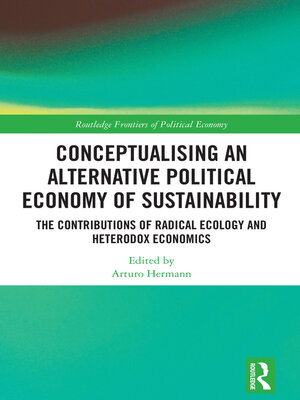Conceptualising an Alternative Political Economy of Sustainability
ebook ∣ The Contributions of Radical Ecology and Heterodox Economics · Routledge Frontiers of Political Economy
By Arturo Hermann

Sign up to save your library
With an OverDrive account, you can save your favorite libraries for at-a-glance information about availability. Find out more about OverDrive accounts.
Find this title in Libby, the library reading app by OverDrive.



Search for a digital library with this title
Title found at these libraries:
| Library Name | Distance |
|---|---|
| Loading... |
Engagement with and between a plurality of progressive, non-neoclassical traditions is an important step in fostering a more capacious understanding of sustainability ― both as a concept and as a political objective. To that end, this book provides a far-reaching overview of the development of radical ecology and heterodox economics on the issues of sustainability, highlighting the presence of different but largely complementary perspectives and arguing that greater engagement between these schools of thought is required to help formulate viable alternatives to the prevailing neoliberal ideology.
The chapters of this volume demonstrate, from various theoretical perspectives of radical ecology and heterodox economics (in particular, degrowth, ecosocialism, original institutional economics, theories of complex systems), the conceptual, ontological, epistemological and political economic limitations of existing mainstream accounts of sustainability, grounded, as they are, in neoclassical environmental economics.
The international cast list of contributors argues in favour of heterodox theories to inform an alternative political economy of socially just sustainability by considering how these are grounded in a more realistic, holistic and critical economics. Each chapter in this section examines how the schools of thought under consideration articulate the political economic foundations of "sustainability" and, in turn, what these mean in-practice over how, in policy action, sustainability should be achieved.
This volume is essential reading for anyone concerned with a viable alternative conception of sustainable economy, and in particular with readers from all strands of radical ecology and heterodox economics, policy makers, institutions and organisations dealing with the issues of sustainability.







